- Home
- Chaim Potok
In the Beginning Page 12
In the Beginning Read online
Page 12
“Sure Catholics have picnics.” He gave me a queer look. Eddie Kulanski raised his head slightly and fixed his half-closed eyes on my face.
I pumped the pedals of my tricycle back and forth in short thrusting motions. It was shady beneath the maples on the street. But the air was very warm and I felt strange strength in my arms and legs.
“My father told me we got permission from the zoo for the picnic,” I said. “He had to write a letter and everything. They have to tell the zoo a long time in advance or they can’t have it.”
Eddie Kulanski looked back down at the game of marbles on the sidewalk.
I rode off and spent the morning on the tricycle and was not weary when I had to go in for lunch. I parked the tricycle under the stairway in the entrance hall and went upstairs. It was strange that my legs were not shaking and trembling after all that time on the tricycle.
I came downstairs immediately after lunch. The door to the right of the stairway opened quietly. Mrs. Horowitz stepped into the entrance hall.
I was dragging my tricycle through the hallway. I stopped and looked at her and was a little frightened. She was skinny and wrinkled; her large eyes and thin neck gave her the appearance of a bird.
“You’re all better,” she said, smiling.
I did not know what to say. I nodded. Her breath was sour.
“I have other special things to give your mother. She’s a smart woman, your mother. Smart. She knows whom to ask for help. Against fever I found something from the Bible—Numbers, chapter twelve, verse thirteen, and Deuteronomy, chapter seven, verse fifteen. There’s nothing more powerful than a verse from the Bible. Nothing. It says so in the holy books I have. We’ll be friends, yes? You don’t want to hurt an old lady.”
I could not grasp what she was saying.
“There are verses against enemies and demons and the evil eye. But sometimes the evil eye is too strong.” She gazed at me out of her large eyes as if I were supposed to understand what she was saying.
I began to edge away from her, pulling my tricycle.
“I found a special prayer for a good memory. I gave it to your mother. You say it after Havdalah. It’s in the holy books.”
“What?” I said, bewildered.
“Promise you’ll stay away from my dog,” she said abruptly.
I stared at her.
“He’s a new dog. Promise.”
I could smell her sour breath and see the tiny cracks in the powder on her cheeks.
“Promise,” she said again. “Promise.”
I did not know what she was talking about. Inside the apartment I heard a dog bark briefly.
“I promise,” I heard myself tell her because I wanted to get away from there and be outside on my tricycle.
Her powdered, wrinkled face broke into a smile. “You won’t be sorry,” she said. “My father’s uncle was the Rhiziner Rebbe. He made miracles. I’ll pray for you. I have books with prayers and charms for everything. You won’t be sorry. But take away the evil eye.”
She stepped back into the apartment and closed the door. The entrance hall echoed faintly with her words. I stared at the door. Then I decided she was a little crazy and it was too nice a day to spend any part of it thinking about Mrs. Horowitz. I brought my tricycle down the stoop and mounted it.
Joey Younger appeared as if out of the air, dirty, sweaty, greedy. “Can I have a ride, Davey?”
“Sure, Joey. Later. When my mother brings my brother out.”
“But that’s a long time, Davey.”
Near the stoop, Tony Savanola and Eddie Kulanski were engaged in a game of bottle caps.
“I’ll race you to the corner, Joey. Can you beat my tricycle?”
For more than an hour I rode back and forth on my tricycle. I went up the side street with it to the wide boulevard that ran alongside the zoo. I rode it back to my street, quickly, feeling the exhilaration of new strength and the wild flush of giddy joy from the sense of power and freedom I now had. I did not know where it had all come from and I did not care. I had it; it was in my arms and legs. I had been sick in bed and some strange thing had happened to me in that time and now I was absolutely and truly well and I could enjoy it, love it, feel the wind of it and the sun of it on my face, watch the swift sliding of the sidewalk beneath my wheels and the dark green of the branches over my head. I rode with that happiness for a long time, pumping my wheels and looking at the underside of the leaves on the maples and at Joey Younger’s sad face each time I passed him by and at the sunken features of the old man asleep on his chair in the sunlight. I rode joyously and wildly and I rode over Eddie Kulanski’s hand.
I felt it as a slight bump. It made no sound. It was the faintest of obstacles. It was Eddie Kulanski’s hand.
The tricycle did not weigh very much and I did not add to its weight to any great degree. But the grooves of my narrow right rear tire had picked up pebbles somewhere and the pebbles went over Eddie Kulanski’s hand as it rested on the sidewalk supporting his lanky form while he steadied himself for an attack upon one of Tony Savanola’s bottle caps. The pebbles inflicted pain and broke the skin of the hand a little above the knuckles.
Eddie Kulanski shouted and jumped to his feet, staring at his hand. I rode on and heard him shouting. It was a moment before I realized that the bump I had felt was more than a sidewalk indentation. I wheeled around and rode quickly back.
Eddie Kulanski was staring at the blood coming from the small cut on the top of his hand. He looked at me and said, “You fucking son of a bitch.”
“Hey,” Tony Savanola said. “It was an accident, Eddie.”
Eddie Kulanski stared at his bleeding hand. I looked at the hand and down at the tire. It was then that I saw the pebbles.
“You son of a bitch. Look what you did to my hand,” Eddie Kulanski said.
“The pebbles did it,” I said.
They stared at the tire.
“It’s not bad,” Tony Savanola said, looking closely at Eddie Kulanski’s hand. “My mom can fix it for you.”
“It hurts like hell,” Eddie Kulanski said.
“I’m sorry,” I said.
“You’re sorry,” Eddie Kulanski said. “You ride around like you own the sidewalk.”
“I was only—”
“It really hurts,” Eddie Kulanski said.
“Come on inside,” Tony Savanola said. “I’ll ask my mom to—”
“You Jew fuck,” Eddie Kulanski said.
“Hey, come on, Eddie,” Tony Savanola said. “It was just an accident.”
“He did it on purpose,” Eddie Kulanski said.
“What?” I said.
“You did it on purpose, you fuck,” Eddie Kulanski said, and he took a step forward, put both his hands on the handlebar of my tricycle, and pushed with all his weight, sending me backward toward the curb of the sidewalk.
My legs had been off the pedals. I put the heels of my sneakers on the ground and stopped the tricycle before it reached the curb.
“What did you do that for?” I said.
“Get out of here,” Eddie Kulanski said.
“You could’ve hurt me,” I said.
“What’s this?” Eddie Kulanski said, holding up his bruised hand. Again he took a step forward. His eyes were half-closed. “What do you call this?”
I sat on my tricycle and looked at him. No. I would not let him darken my clean new white world. Not for a stupid accident.
“I didn’t mean to do that,” I said. “I’m really sorry.”
“I’m really sorry,” he mimicked my high voice. “I’m really sorry. Listen to the creep, Tony. He talks like a baby. I’m really sorry. I don’t believe you, you Jew creep.”
Again, he put his hands on the handlebar of the tricycle and pushed me backward very hard.
“Hey, cut it out, Eddie,” Tony Savanola said.
Behind me was the afternoon traffic that traveled our cobblestone street.
I turned the wheel of my tricycle and pedaled forward
to get away from the curb and his pushing hands. I thought I would get down off the tricycle; but I feared he would send it into the street beneath the wheels of a car. He would say I had deliberately run over his hand and he was only getting back at me. What was wrong with him anyway? He seemed a little crazy to me. He was trying to hurt me badly and I had not hurt him badly at all; and besides it had been an accident.
He moved in front of the tricycle and blocked my way.
Joey Younger, who had been sitting on the stoop, now rose slowly to his feet. He stood about ten feet away, watching, his thin greedy face suddenly fearful.
“Get out of my way, Eddie,” I said. “I don’t want no trouble with you.”
Tony Savanola went quickly up the stoop and into the house.
“I don’t want no trouble with you,” Eddie Kulanski mimicked. “You think you own the sidewalk and all the money and the picnic places and everything.” He was pushing me backward toward the curb. “You fucking kike. My father says you stink up the world.” He kept leaning on the handlebar and forcing the tricycle backward. I held my feet down hard on the pavement but I could not match his weight.
“Hey, you, Eddie Kulanski!” Mrs. Savanola shouted, appearing suddenly in her window. “Are you crazy? What you doing?”
Eddie Kulanski released the handlebar. Mrs. Savanola quickly withdrew her head from the window. The curb was a foot or so behind me. Cars went by, going quickly over the cobblestones. He stood there, looking at me and at the tricycle and back again at me. There was a queer smile on his lips. His thin features seemed made of points and edges: pointed nose and chin, high cheekbones planing down from sharp ridges of bone. His face had changed as he had pushed me backward; it had become stony and old. But I knew I was imagining it. Hate could not make anyone old. He had forgotten completely the cut in his hand.
He stood there, looking at me, breathing heavily, and hating me. He seemed more a force than a person. I did not believe anyone capable of such hatred. I had never seen such hatred. The clean white world had lasted half a day. The weakness had returned to my legs. The Angel of Death and his accidents had survived the second flood. I bowed my head and wanted to cry.
Eddie Kulanski put his hands on the handlebar of my tricycle.
The entrance door to the apartment house was thrown open and Mrs. Savanola came quickly down the stoop, her fat form and many chins quivering with anger. She pointed a stubby finger at Eddie Kulanski.
“Hey, you, what you doing?” she shouted. “You leave that boy alone.”
Eddie Kulanski looked at her with malevolence. Then he looked past her at Tony Savanola who had come outside and was standing on the top step of the stoop. I glanced quickly up and down the street. Two boys who had been playing a marbles game in front of the building to the right now broke off their game and looked at us. A curtain stirred in the window to the left of the entrance door where Tony Savanola stood.
“Shame on you, you fighting a sick boy!” Mrs. Savanola shouted. “Leave him alone, you!”
She towered over him like a raging whale. Eddie Kulanski released the handlebar and backed away slowly from her finger.
“You crazy?” she shouted. “You push him in the street, you make a accident.”
He glared at her sullenly out of his sleepy-looking eyes. Then he said something to her in the language I did not understand, ran past her, bounded up the stoop, brushed Tony Savanola aside, and disappeared into the house.
Mrs. Savanola looked at the entrance door. “That’s a bad boy sometimes,” she said. Then she looked at me. “You be careful how you ride your bike, Davey.”
“Yes,” I heard myself say in a dry, quivering voice.
“You all right, Davey?”
I nodded.
“You go upstairs and rest. You white like a ghost.”
The curtain in the window to the left of the entrance door stirred again and I saw, dimly through the white gauzy material, the birdlike face of Mrs. Horowitz.
I climbed down from the tricycle and brought it over to the stoop. Tony Savanola came down the three steps and helped me drag it up. Joey Younger stood by, watching.
Inside the doorway, Tony Savanola said, “You were riding wild, Davey. But he shouldn’t have done that. He could’ve made a bad accident.”
“I was having fun, Tony. I was feeling very good. I don’t feel very good too many times.”
He looked down at the floor.
“It was a good feeling, Tony. I can’t remember when I felt that feeling before. I didn’t mean to make the accident.”
He seemed embarrassed to hear me talking that way.
“I hope he won’t get angry at you, Tony. I hope he won’t stop being your friend.”
“Nah, he won’t stop. He gets angry easy but he stops quick.”
“He hates me because I’m a Jew.”
Tony Savanola said nothing.
“I don’t hate him because he’s a Catholic.”
Still Tony Savanola said nothing.
The entrance door opened. Mrs. Savanola came into the hall.
“You go upstairs and rest, Davey Lurie. You tell your mama I said you should rest a little bit.”
She went into her apartment to the left of the stairway. Tony Savanola went back outside.
I dragged the tricycle beneath the stairway and bent to peer at the rear right wheel. I felt the pebbles. There were three of them, wedged tightly in the tire. I could not get them out.
Somewhere in the hall a door opened and a dog barked. I heard soft footsteps and straightened quickly and stared up into the powdered wrinkles that lay across the features of Mrs. Horowitz.
“I saw and heard,” she said in a cautious whisper. “That boy is evil. He is a hater of Jews.”
“I have to go upstairs,” I said.
“Certainly,” she said. “I understand. But there are things that can be done. We are not helpless.”
I stared at her.
“There is a charm with names,” she said eagerly.
I moved around her toward the stairs.
“Can you read yet?” she asked in a sudden shrill voice.
I stopped. “A little.”
“Good,” she said, dropping her voice to a thin whisper. “Very good. I have books. Many books. My father, may his soul rest in the Garden of Eden and may he be a good interceder for me, left me two walls of books. Most of them I cannot understand. My son cannot read any of them. You understand me?”
I did not understand and wanted to get away from her.
“I have charms for your reading and your memory. I will make a charm to take care of that Polak. Don’t worry yourself. Keep away the evil eye. We will be partners.”
I fled upstairs, her thin shrill voice echoing inside my head.
He met me on the stairway the next morning. I was going down, he was going up.
“I’m really sorry,” I said. “About the accident.”
“Shit on you,” he said, his pointed features stiffening, and continued on up the stairs.
Outside I sat in my chair in the sun. The entrance door to the apartment house was opened and a large, black, long-haired dog raced down the stoop. It went immediately to the maple in front of the
house and lifted a hind leg. It squatted on the sidewalk and emitted coils of black feces. Then it ambled along the street sniffing at tree trunks, turned the corner, and was gone.
Joey Younger rode up on my tricycle.
“I just saw Eddie Kulanski and his cousin on the boulevard.”
I said nothing.
He gave me a pitying look. Then he said, “Can I have one more ride around the block?”
“I’m going inside,” I said.
“One more ride, Davey.”
I stood up. “Get off,” I said.
He looked at me. Then he dismounted.
“You didn’t ask me to race you today,” I said. “How come you didn’t ask me to race you?”
He did not say anything.
“Why didn�
��t you help yesterday?” I asked. “I could’ve been hurt.”
He shrugged.
“You just stood there,” I said.
“It wasn’t my business,” he said. “I don’t want no trouble from that crazy Polak.”
“But I could’ve been hurt.”
“I didn’t want no trouble. Especially from his cousin. It was your accident, Davey. You were riding all day too fast.”
“I was having a good time. For the first time in I can’t remember when, I was enjoying myself.”
He shrugged again.
“I’m going upstairs,” I said.
“Can I ride the bike tomorrow?”
I looked at him. “No,” I said.
I struggled up the stoop with the tricycle, got it through the door, and put it under the stairway.
I heard the front door open. There was the sound of animal legs on the marble floor. I came out from beneath the stairway and saw Mrs. Horowitz standing in her doorway. She had on a dark blue bathrobe. Her hair was dry and gray. There was no powder on her face. She looked very old and weary.
“David,” she said. “How are you feeling?”
I told her I was feeling all right.
“Yes? I am glad to hear it. The charm is working.” She sounded tired. Her voice was hoarse. She peered at me through watery eyes. I saw her eyelids were inflamed. “I am having one of my bad days. Nothing works. If I could understand the books I would find something that works. But most of them I cannot understand. One day you will come in and see the books, yes?”
I nodded slowly and said nothing.
“You saw my new dog?” she asked eagerly.
I nodded again.
“A lovely animal. A comfort. You will be good to him, yes? His name is Bilam. You gave your word. I have prepared a charm to help you in your study of Bible when you begin school. A special charm. What is greater than studying the Bible to protect oneself, ah? Nothing. Nothing is greater. The charm is yours.” She shivered suddenly and pulled the robe closer to herself. “A cold wind on such a hot day?” she muttered. “There are strange beings about. I will give the charm to your mother. Your mother informs me that you dream. One day you must tell me one of your dreams. I have many dream books, some by Joseph and Daniel. I have the famous dream book by Solomon Almoli. You will tell me your dreams, yes?” She peered at me intently out of her inflamed, watery eyes. From within the apartment came the barking of the dog. She smiled. “He is hungry. He eats like two men. But he is a comfort. Dogs know when the Angel of Death comes to a neighborhood with his poisoned sword. They won’t move. You didn’t know that? Oh, yes. That’s the truth. You will come in to see the books? My son never comes. Never. Goodbye.”

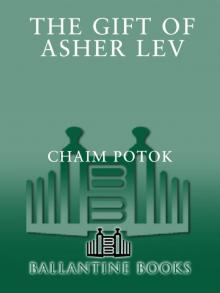 The Gift of Asher Lev
The Gift of Asher Lev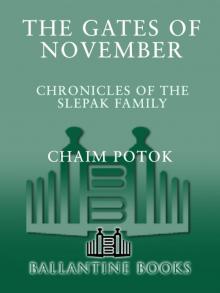 The Gates of November
The Gates of November In the Beginning
In the Beginning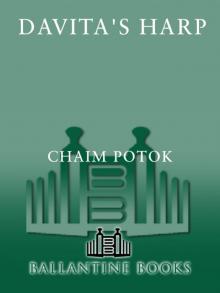 Davita's Harp
Davita's Harp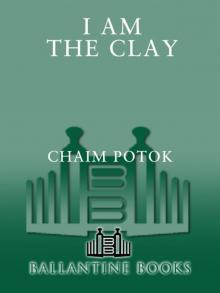 I Am the Clay
I Am the Clay The Promise
The Promise The Chosen
The Chosen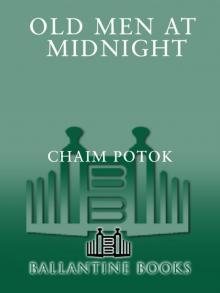 Old Men at Midnight
Old Men at Midnight My Name Is Asher Lev
My Name Is Asher Lev